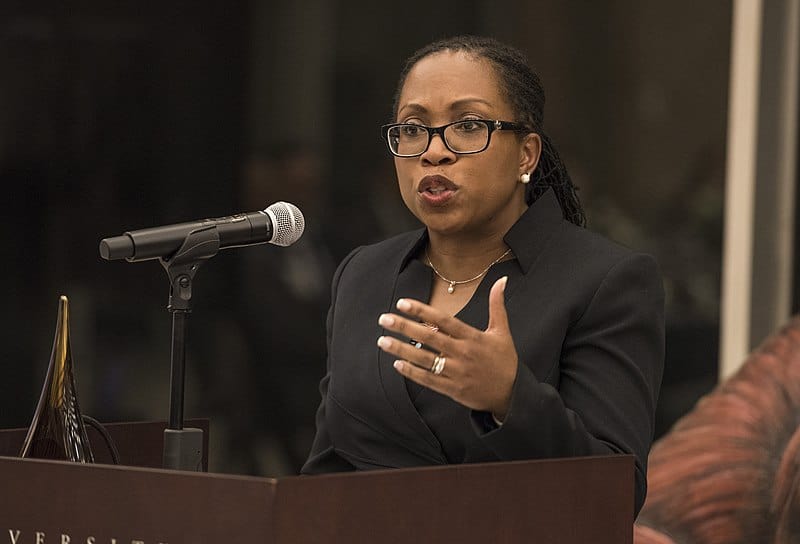
Tascha Shahriari-Parsa is a government lawyer enforcing workers’ rights laws. He clerked on the Supreme Court of California after graduating from Harvard Law School in 2024. His writing on this blog reflects his personal views only.
Earlier this morning, Bloomberg Law reported that Joe Biden plans to nominate Judge Ketanji Brown Jackson as the first Black woman on the Supreme Court. Earlier this month, Brown’s first decision after her appointment to the Court of Appeals for the D.C. Circuit struck down a 2020 rule by the Federal Labor Relations Authority to make it harder for public sector workers to engage in collective bargaining. When she was on the U.S. District Court for the District of Columbia, she also halted three of Trump’s executive orders that would have respectively boxed the subjects that federal workers’ unions could bargain with the government over, reduce the time that unionized federal employees can spend on union business (because it was, according to the Trump-FLRA, a waste of taxpayer money), and limit workers’ rights to appeal disciplinary actins. Jackson stated that these orders would have “eviscerate[d]” the collective bargaining rights of federal workers—though her decision was later reversed by the D.C. Circuit.
This morning, a panel of the D.C. Circuit—including Judge Jackson—heard oral arguments on the Board’s joint employer standard in Sanitary Truck Drivers v. NLRB. In 2015, the Board changed the joint-employer standard to require that a business have “sufficient control over employees’ essential terms and conditions of employment to permit meaningful collective bargaining” in order to be considered a joint-employer. In 2018, the D.C. Circuit required the Board to go back and explain some of the factors that constituted “sufficient control.” Then, in 2020, Trump passed a regulation that shifted the joint employer test, requiring “substantial direct and immediate control” over workers for a business to be considered a joint-employer.
Much of the controversy in the current case is on the question of retroactivity, as the Board in 2020 then ruled that it would be unfair to retroactively apply the 2015 rule to events in 2013, because the business had constructed its business model in reliance of the pre-2015 standard. The Board justified the retroactivity standard on the basis that the 2015 Board decision was a “sea change” in board law that completely transformed the legal structure in which employers operated. You can listen to the oral arguments here; the case is second in order and begins about 30 minutes in.
In more Starbucks news, on Wednesday, 29 chairs and vice-chairs of house and senate committees on labor in 17 states and the District of Columbia submitted a letter on Wednesday urging Starbucks CEO Kevin Johnson to cease the company’s union–busting activities. As Kevin reported last Sunday, Starbucks has spent tens of millions of dollars to hire a law firm to turn its managers into union-busting experts, has launched a litany of propaganda including a website dedicated to persuading—or scaring—workers to vote against the union, and has been sending corporate managers into stores to convince workers not to unionize. Workers have cited “captive audience meetings, one-on-one meetings, store shutdowns, closures, remodelings, and text messages—a mode of contact that was previously used only for emergencies.”
The letter from the labor committee heads urges Starbucks “to follow the letter and spirit of the law by allowing [its] employees free choice in joining a union without coercion or retaliation . . . .” Rep. Zack Fields (D-Anchorage), Co-chair of the Alaska House Committee on Labor and Commerce, commented that “[t]he diversity of signatures from legislative leaders across the nation expresses the urgency in Starbucks Workers United fight for fair wages, benefits, and better working conditions.”
As William reported yesterday, Starbucks filed an appeal with the NLRB arguing that any union election should cover a broader region rather than a single store. Starbucks needed to submit a statement of position by noon on February 11th; however, Starbucks did not turn in the file until 12:03pm. Starbucks claimed that Microsoft Outlook crashed when counsel for Starbucks initially attempted to serve the Statement of Position. Starbucks and the union have argued over whether the 12pm deadline is a bright line rule, whether a delay can be excused for good cause, and the relevance of the absence of prejudice—prejudice that one might only expect if the delay was longer than a few minutes. The Board sided with the union and concluded that Starbuck’s failure to meet the 12pm deadline “precludes it from litigating any of the issues raised in its untimely submission.” The Board noted in particular that the applicable rules and regulations were amended in 2015 to intentionally institute a bright-line rule and consequences for non-compliance for matters including the statement of position that Starbucks failed to submit on time.






Daily News & Commentary
Start your day with our roundup of the latest labor developments. See all
February 1
The moratorium blocking the Trump Administration from implementing Reductions in Force (RIFs) against federal workers expires, and workers throughout the country protest to defund ICE.
January 30
Multiple unions endorse a national general strike, and tech companies spend millions on ad campaigns for data centers.
January 29
Texas pauses H-1B hiring; NLRB General Counsel announces new procedures and priorities; Fourth Circuit rejects a teacher's challenge to pronoun policies.
January 28
Over 15,000 New York City nurses continue to strike with support from Mayor Mamdani; a judge grants a preliminary injunction that prevents DHS from ending family reunification parole programs for thousands of family members of U.S. citizens and green-card holders; and decisions in SDNY address whether employees may receive accommodations for telework due to potential exposure to COVID-19 when essential functions cannot be completed at home.
January 27
NYC's new delivery-app tipping law takes effect; 31,000 Kaiser Permanente nurses and healthcare workers go on strike; the NJ Appellate Division revives Atlantic City casino workers’ lawsuit challenging the state’s casino smoking exemption.
January 26
Unions mourn Alex Pretti, EEOC concentrates power, courts decide reach of EFAA.